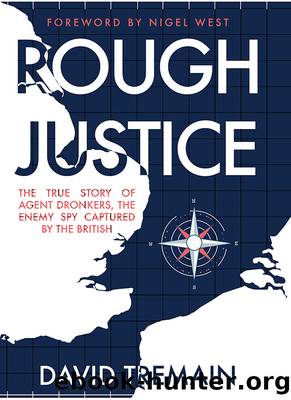Rough Justice: The True Story of Agent Dronkers, the Enemy Spy Captured by the British by David Tremain

Author:David Tremain [Tremain, David]
Language: eng
Format: epub
ISBN: 9781445661599
Google: DrRNDQAAQBAJ
Amazon: 1445690799
Published: 2016-10-15T03:08:29+00:00
18
The Trial, Day Three
Tuesday 17 November 1942
In his summing up on the final day of the trial, Mr Justice Wrottesley reminded the jury of the charge of which Dronkers was accused: that of entering the United Kingdom, an act intended to help the enemy. Technically, this charge was incorrect since the Immigration Officer at Harwich had formally refused permission for Dronkers and his compatriots to land under the Aliens Order, 1920. Therefore Dronkers had not actually entered the country, even though he was, of course, subsequently incarcerated on British soil, something which the defence should have argued during Maxwellâs presentation of the case.
The judge suggested to the jury that they should not have any problems in determining the outcome of the case when he said, âThere is not going to be any difficulty in your way in this case in coming to a conclusion â¦â This statement seems a bit ambiguous and the semantics leave it open to interpretation. It could be taken to mean that (a) the jury would reach the only conclusion they could, by finding Dronkers guilty as charged; or (b) the jury would arrive at the only just conclusion, either guilty or not guilty. Whatever the judge intended to mean, it looks as if he were directing the jury to find Dronkers guilty. The burden of proof, he said, rested with
the Crown, the prosecution, to satisfy you beyond all reasonable doubt that this man is guilty of the offence that is charged against him, and if, after weighing the evidence on either hand, the arguments addressed to you on either hand, and giving such weight as you think right to the observations which I make to you, if, after weighing all that, the conclusion to which you come is one of doubt, and you are not really sure beyond all reasonable doubt that this man was a spy, you have to give him the benefit of it.1
He added that if the jury believed that Dronkers was in fact bluffing the Germans and had not really intended to spy, but was using it as a means of escaping from Holland and the Germans, then they would have to find him not guilty. However, if they were satisfied that the evidence caused them to believe that the bluff was a cover for the reason for his escape, then they must find him guilty.
The judge provided yet another review of the main points of evidence: Dronkersâ motivation for working for the Germans being money; the meetings with Verkuyl and with his brother-in-law, Klever; the introduction to âDr Schneiderâ; the implication that at the point of recruitment, there was no suggestion of Dronkers wanting to escape from Holland [my italics]; the salary Dronkers had been earning; and the promises made by âDr Schneiderâ of financial remuneration. The judge reminded the jury of Dronkersâ belief that, according to âDr Schneiderâ, his wife would be paid even if he was unable to provide the information the Germans sought. The judge also reminded them of the prosecutionâs question of whether this could be seriously believed.
Download
This site does not store any files on its server. We only index and link to content provided by other sites. Please contact the content providers to delete copyright contents if any and email us, we'll remove relevant links or contents immediately.
Spare by Prince Harry The Duke of Sussex(5168)
Machine Learning at Scale with H2O by Gregory Keys | David Whiting(4284)
Never by Ken Follett(3924)
Harry Potter and the Goblet Of Fire by J.K. Rowling(3837)
I Have Something to Say by John Bowe(3492)
Unfinished: A Memoir by Priyanka Chopra Jonas(3367)
Fairy Tale by Stephen King(3360)
Greenlights by Matthew McConaughey(3147)
The Man Who Died Twice by Richard Osman(3057)
Will by Will Smith(2894)
Think Again by Adam Grant(2457)
Rationality by Steven Pinker(2345)
It Starts With Us (It Ends with Us #2) by Colleen Hoover(2320)
Can't Hurt Me: Master Your Mind and Defy the Odds - Clean Edition by David Goggins(2315)
The Dark Hours by Michael Connelly(2294)
The Storyteller by Dave Grohl(2214)
Friends, Lovers, and the Big Terrible Thing by Matthew Perry(2209)
The Dawn of Everything: A New History of Humanity by David Graeber & David Wengrow(2185)
The Becoming by Nora Roberts(2180)
